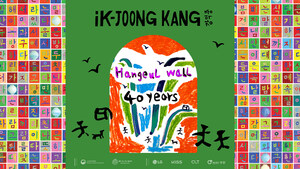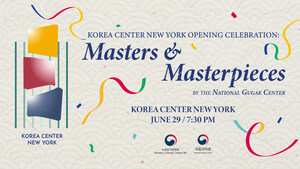NEW YORK, March 24, 2021 /PRNewswire/ -- Korean Cultural Center New York (KCCNY), a branch of the Ministry of Culture, Sports and Tourism (MCST) of the Republic of Korea is pleased to announce the final Open Stage performance series in our beloved space at 460 Park Avenue in New York City. KCCNY presents a total of 6 performances for 2021 Open Stage: "Goodbye 460 Park, Building the Future Together" ranging across genres of Korean traditional music and dance, jazz, contemporary music, to K-pop crossovers. The selected artists include rising star jazz composers, an innovative Korean ritual performance duo, renowned Korean traditional performers, and a professional quartet based in New York who will present Korean culture inspired performances to global audiences. The lineup features: SaaWee, the Rin Seo Chamber Ensemble, Rami Seo's World Music Ensemble, Eunbi Kim, Jihye Lee Orchestra, and the Argus Quartet.
The Open Stage public contest was first launched in 2012 to provide a platform for artists seeking to promote and globalize Korean culture-inspired performances in the US. This year, with the difficulties faced due to the Covid-19 pandemic and to encourage safety for all, the Open Stage program is taking its platform online. To further celebrate KCCNY's final year of calling 460 Park Avenue "home" before moving to the New York Korea Center, this season's selected performers will have a chance to film their performance in our space to then be streamed online for viewers.
2021 Open Stage aims to provide a stage for talented performers, to support artists, and to invigorate the cultural landscape by offering performance opportunities.
PROGRAM
March 26: "WERO" by SaaWee
There is a deep sense of loss : Loss of time, loss of careers, loss of loved ones.
These are all deeply affecting the society as whole and each individual uniquely.
SaaWee performs a healing ritual that caresses the pain and transforms the pain into healing.
SaaWee has created a performance ritual of consolation through the ritual WERO. As the Korean word WERO represents, SaaWee dedicates this ritual to those who are in suffering due to the loss caused by Covid-19 and hopes to connect widely with people who are in pain through the experience of the Covid-19 pandemic.
A total of 5 stages represents the cycle of openness, recognizing and embracing the pain, and celebration of transformation into healing. SaaWee recognizes the cycle of life and death and attempts to borrow the wisdom of nature in order to face the pain caused by the loss. Only when we tap into our innate nature to create, connect, and harmonize, the transformation happens. In order to overcome this loss, we dance, and we sing. A new ritual is in place to redirect lives into hopeful ways.
In the performance, SaaWee invites 5 different Gods to open the spiritual space for people. When it is blessed with Gods, performers, and audiences are connected into a harmonious realm.
April 30: "The Sounds of Winds and Ten Fingers" by the Rin Seo Chamber Ensemble
The Rin Seo Chamber Ensemble performs three original compositions by Seo which uses traditional Korean sounds, and one arrangement of the Korean traditional music piece, "Arirang."
The first piece "Play," is composed by using the Korean traditional Chil-chae rhythm. Chil-chae is rather complex, but has a very energetic and interesting cadence. Seo wanted to convey a positive energy to the audience through this rhythm and variation with the sound of five reed instruments. The second piece "Jazz Suite'' is an award-winning composition: the ASCAP Herb Alpert Young Jazz Composer Award and the Downbeat Student Music Award. The piece is comprised of four movements; first: Blues, second: Boogie Woogie, third: Spanish Tinge, and fourth: Ragtime. Seo combined early Jazz music idioms with modern harmony, rhythm, and sounds. The third piece "Floating" is written for the reed quintet, Korean traditional reed instrument saenghwang, and piano. Seo was inspired by the saenghwang's attractive yet unique sound and wanted to combine it with the reed quintet's warm sound. "Floating" means not being settled in a definite place, and the piece reflects immigrants' unsettled minds. The last piece is Seo's arrangement for Korean folk song "Arirang," which she reinterpreted with modern harmonies and sounds.
This program plans to introduce a mixture of both Korean and Western musical concepts to the world. The Ensemble hopes this program will provide consolation and positive energy to the audience during this difficult time.
May 28: "Korean Fever: Returns" by Rami Seo's World Music Ensemble
Since the 1988 Seoul Olympics to the 2000s, Korea has enjoyed remarkable economic growth and renaissance in the cultural and artistic world. "Korean Fever: Returns" is a project that shows the hope and desire to enjoy a time of prosperity and growth once again after the 2018 Pyeongchang Olympic Games. It is a world tour that begins in Korea and travels to the US, Africa, Asia, and Europe and gives dreams and provides healing to audiences. While much has been lost due to the coronavirus, this time of great loss has also proved to be an opportunity for Korea to show its potential as a leader in the future of economy, culture, and medical science. While gayakeumist Rami Seo wasn't able to continue the world tour that was planned for France and South Africa in 2020, through this new platform for performing music, she hopes to provide a time of healing and comfort to all those who love and appreciate Korean culture and Koreans around the world.
Rami Seo's Ensemble, comprising New York's top musicians, aspires to breathe with, and share an appreciation for life and art with the audience. Moreover, Korean immigrants around the world will be able to relate to the joys and sorrows, embedded in the music, that Rami Seo has herself experienced as an immigrant artist.
June 25: "Words Unsaid" by Eunbi Kim, Music by DBR
Eunbi Kim's 35-minute program has a meditative and personal nature comprised of contemporary classical music written specially for her by Emmy-winning composer Daniel Bernard Roumain (DBR) for solo piano, pre-recorded voices, and drum kit, with custom lighting design by Chris D'Angelo.
The program is titled "Words Unsaid" because of the way these pieces delve into feelings that often stay hidden, just beneath the surface. Inspired by the death of the musician Prince, the first piece, "Songs for the Alone" explores what those left behind often feel but can't express. Premiering for the first time at the Korean Cultural Center in its format of piano and drum kit (with guest musician Wen-Ting Wu), "Songs for the Alone" is described by its composer, DBR, as "intimate works exploring the moods and modes and feelings of isolation, personal inquiry, and the questioning of ourselves. Each movement expresses grief and depression in their own way. And like any trial or test, there are fleeting moments of light and rare glimpses of love."
The second piece, "It Feels Like A Mountain, Chasing Me," came out of a conversation one evening where the composer Daniel Bernard Roumain (DBR) drew out of Eunbi thoughts about her relationship with her Korean immigrant parents that had always been, but not truly known. Through what feels like eavesdropping on a conversation told in snippets of time and memory, the music and voices work in tandem to create a unique soundscape and personal experience for every listener to reflect on their own memories and past.
July 30: "Jazz Orchestra Plays Gugak" by Jihye Lee Orchestra
The Jihye Lee Orchestra has been premiering new works since 2018 that composer Jihye Lee has created by bringing Korean traditional music into jazz orchestra art form. The Orchestra will be performing arrangements of Korean pansori "Bang-Ah Taryung," "Sae Taryung," and folk song "Arirang" along with Jihye Lee's original compositions incorporating Korean traditional music elements. "Nowhere Home" depicts immigrants' wandering souls and "Karma" delivers special Korean emotional statement: up-bo (업보). Those repertoires will be played by a 10 piece-orchestra, consisting of 9 players with a composer/conductor.
"We believe many hearts can be touched by listening to the classic Korean folk song numbers. The music from motherland, that is deeply carved in our soul will provide comfort and encourage us to overcome these challenging times."
This program can be a chance to reach out to a wider audience globally online, to let them hear how two different art forms from East and West can harmonize, complement one another, and create a new unheard sound. The musical experiment can inspire listeners to be open-minded, to embrace differences in culture, and ultimately bring peace to the world in these challenging times.
August 27: Argus Quartet
The performance by Argus Quartet will present Juri Seo's string quartet "Infinite Season." Preceding this four-movement work will be audio recordings of personal narratives spoken by Korean and Korean-American voices, featuring memories of and reactions to the seasons—both the seasons as they occur in nature and the metaphorical seasons of life. A variety of voices are represented from different "seasons'' of life, from young children to older adults in their 70s and 80s. Throughout the musical performance itself, videos by renowned videographer Hyungkun Lee of Korean landscapes throughout the seasons will be projected to illustrate the changing nature of the music.
Juri Seo is a Korean-American composer and professor at Princeton University. "Infinite Season" was commissioned by the Koussevitzky Foundation for the Argus Quartet. The piece blends field recordings of bird calls and cicadas within the string quartet texture to evoke a strong presence of nature.
In all performances, the Argus Quartet strives to connect with music lovers of all ages who are open-minded, inquisitive, and excited to hear music presented in bold and unique ways. Through this <2021 Open Stage: "Goodbye 460 Park"> project, the Quartet hopes to specifically highlight Korean culture through recorded voices, stories, and videos from the Korean and Korean-American communities. The Quartet wishes to actively engage and connect with people from the Korean community in a deep way by talking to them and hearing their stories, and looks forward to sharing this special project with our own network so people can have the opportunity to interact with and celebrate vibrant Korean culture.
ABOUT THE ARTISTS
SaaWee
SaaWee was formed in 2018 to manifest spiritual aspects of Korean traditional music through contemporary music and art language in hopes to connect with a global wide audience. Since then, SaaWee has performed throughout the world including New York, London, Paris, Berlin, Amsterdam, Bogota, and Seoul. Each performance is intended to be a unique production symbolizing the ungraspable quality of each moment. SaaWee often creates openness of ritual by inviting a new collaborator in each city and together they create a story that recognizes uniqueness of now. SaaWee also incorporates unique aspects influenced by the space and audience. The most notable example is when SaaWee performed in the WWII bunker of Berlin where the performers moved from one room to another interacting with the meaning of the historical part of the space and the audience who followed the movements of the performers. SaaWee often performs in circular form and includes not only musical aspects but also theatrical,visual, and movement aspects to create 3 dimensional experiences.
Rin Seo Chamber Ensemble
The Rin Seo Chamber Ensemble consists of a reed quintet (oboe, Bb clarinet, alto saxophone, bassoon, and bass clarinet) and the piano. The group performs music composed by Rin Seo, the leader of the ensemble, as well as its composer and pianist. Seo is a New York-based composer whose works range from modern improvised music to cross-breeding classical. Since she was exposed to a diverse musical environment, her music combines eclectic musical idioms and blurs musical boundaries with her own musical color. With the combination of the reed quintet and the piano, and Jazz and modern classical music, her music conveys a unique sound to the audiences.
Rami Seo's World Music Ensemble
Rami Seo's World Music Ensemble is a world music project team based on Korean traditional performing arts established in 2007 to promote Korean traditional culture and arts to the world. The ensemble performs in all genres of music including classical music, jazz, crossover, and contemporary creative music, as well as traditional music. Rami Seo‟s World Music Ensemble has performed at Carnegie Hall, Lincoln Center, Jazz at Lincoln Center (First Korean), UN, Canon Hall in the White House, in addition to consulates of many countries. Rami Seo, with the experience of more than 2000 performances and a graduate degree in ethnomusicology, and her project World Music Ensemble comprising acclaimed jazz musicians is planned for a full-scale world tour Korean Fever: Returns in 2019-2021. Through Korean traditional performing arts, this program will take viewers to experience various different genres, from traditional to modern. This world tour project aims to bring comfort and solace to Koreans around the world, support their lives as immigrants, and inspire pride as Koreans and in Korean culture.
Eunbi Kim
Pianist Eunbi Kim is creating new ways of experiencing concert music as a performer, speaker, and arts advocate. Her adventurous recitals, cast in venues across the United States, are characterized by their vividly personal themes ranging from mental illness to familial memories, and have received international recognition in television and in print. Most known as the creator of music-theater work Murakami Music, she has also recorded an album of Fred Hersch's rare concert music, premiered works by Emmy-nominated composer Daniel Bernard Roumain (DBR), and gave a TEDx talk in 2017. She is based in New York City.
Jihye Lee Orchestra
Jihye Lee Orchestra tells stories through music that is adventurous and honest. The 17 piece jazz orchestra led by Korean composer Jihye Lee, has performed at venues such as Birdland Jazz, Symphony Space, The Jazz Gallery in NYC, Amherst College (MA) and Washington DC Jazz Festival. Jihye Lee's work also has been presented at Jazz at Lincoln Center by JLCO with Wynton Marsalis, Carnegie Hall by NYO Jazz, Eastman School of Music (Rochester), Blue Whale (LA), The Triple Doors (Seattle), Berklee Performance Center (Boston), and in many cities like Shanghai, Beijing, Zhuhai, Tokyo, Taipei, and in her motherland, Seoul, Korea. Jazz Orchestra's wide dynamic range brings colorful emotions and the honesty of her music through the powerful art form invites the audience to humanity.
Argus Quartet
The Argus Quartet is dedicated to encouraging the joys of human connection, community, and discovery by bringing a wide-ranging repertoire to life through bold and meaningful programming and a vibrant commitment to collaboration and education, winning recognition as a "vivacious foursome … [that] plays canonical standards with authority and verve and approaches modern music with care and assurance" (The New Yorker). Praised for playing with "supreme melodic control and total authority" and "decided dramatic impact" (Calgary Herald), the Quartet has quickly emerged as one of today's most dynamic and versatile ensembles, winning First Prize at both the 2017 M-Prize Chamber Arts Competition and the 2017 Concert Artists Guild Victor Elmaleh Competition. Since then, increasingly busy concert seasons have taken the Quartet to some of the country's most prestigious venues and festivals, including Carnegie's Weill and Zankel Halls, Lincoln Center's Alice Tully Hall, Chamber Music Society of Detroit, the Ravinia Festival, the Albany Symphony's American Music Festival, and Music Academy of the West. Highlights of the 2019-20 season included a debut performance for Lincoln Center's Great Performers series, along with a return engagement in New York for the Schneider Concerts at the New School.
ABOUT OPEN STAGE
First introduced in 2012, Open Stage has been playing a critical role in presenting opportunities for rising performers not only based in New York but also directly coming from Korea to display their talents to a wide New York audience. Now in its 7th season, Open Stage is continuously expanding its existing platform, presenting various genres of works including Korean traditional music and dance, modernized Korean creative world music, jazz, as well as contemporary dance and theater. This year, through a highly-competitive process, six groups have been chosen to put on yet again another uniquely wonderful showcase.
SOURCE Korean Cultural Center New York

Related Links
WANT YOUR COMPANY'S NEWS FEATURED ON PRNEWSWIRE.COM?
Newsrooms &
Influencers
Digital Media
Outlets
Journalists
Opted In




Share this article